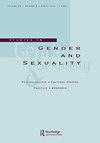非裔拉丁女性:殖民、性别和转型
Q3 Social Sciences
引用次数: 1
摘要
摘要种族、民族、性别、性取向和阶级的交叉增加了非裔拉丁裔女性受压迫的脆弱性。本文从权力、知识和性别的殖民主义角度分析了非裔拉丁裔女性的现实。许多非裔拉丁裔女性与后殖民主义创伤以及殖民心态作斗争。提出了非殖民化解放、女性主义和女权主义以及土著治疗方法,以促进非洲裔拉丁裔女性的转变。具体而言,引入了一种非殖民化的综合治疗方法,旨在增强非洲裔拉丁裔女性的心理健康和丰满,即过上充实生活的Aymara世界观。这种方法涉及解放心理学、女性主义/女权主义和本土治疗与精神分析理论和实践的融合。尽管后殖民和当前社会政治创伤带来了有害影响,但许多非洲裔拉丁裔女性仍在抵抗、战斗和转变。在一种新的意识中,许多非洲裔拉丁裔女性发展出一种革命性的民族-种族-性别认同,这种认同支撑着她们为社会正义而战。本文章由计算机程序翻译,如有差异,请以英文原文为准。
AfroLatinx Females: Coloniality, Gender, and Transformation
ABSTRACT The intersection of race, ethnicity, gender, sexuality, and class increases AfroLatinx females’ vulnerability to oppression. This article provides an analysis of AfroLatinx females’ realities from a coloniality of power, knowledge, and gender perspectives. Many AfroLatinx females struggle with postcolonization traumas, as well as with a colonial mentality. Decolonial liberation, womanism and mujerismo, and indigenous healing approaches are presented to facilitate AfroLatinx females’ transformation. Specifically, a decolonial integrative healing approach is introduced, geared to enhance AfroLatinx females’ psychological wellness and buen vivir, the Aymara worldview of living a life of fullness. This approach involves an amalgamation of liberation psychology, womanism/mujerismo, and indigenous healing into psychoanalytic theory and practice. Notwithstanding the harmful effects of postcolonial and current sociopolitical traumas, many AfroLatinx females resist, combat, and transform. Anchored in a new consciousness, numerous AfroLatinx females develop a revolutionary ethno–racial–gender identity, one that sustains their struggle for social justice.
求助全文
通过发布文献求助,成功后即可免费获取论文全文。
去求助
来源期刊

Studies in Gender and Sexuality
Social Sciences-Gender Studies
CiteScore
0.80
自引率
0.00%
发文量
15
期刊介绍:
Beginning in the final two decades of the 20th century, the study of gender and sexuality has been revived from a variety of directions: the traditions of feminist scholarship, postclassical and postmodern psychoanalytic theory, developmental research, and cultural studies have all contributed to renewed fascination with those powerfully formative aspects of subjectivity that fall within the rubric of "gender" and "sexuality." Clinicians, for their part, have returned to gender and sexuality with heightened sensitivity to the role of these constructs in the treatment situation, including the richly variegated ways in which assumptions about gender and sexuality enter into our understandings of "normality" and "pathology."
 求助内容:
求助内容: 应助结果提醒方式:
应助结果提醒方式:


